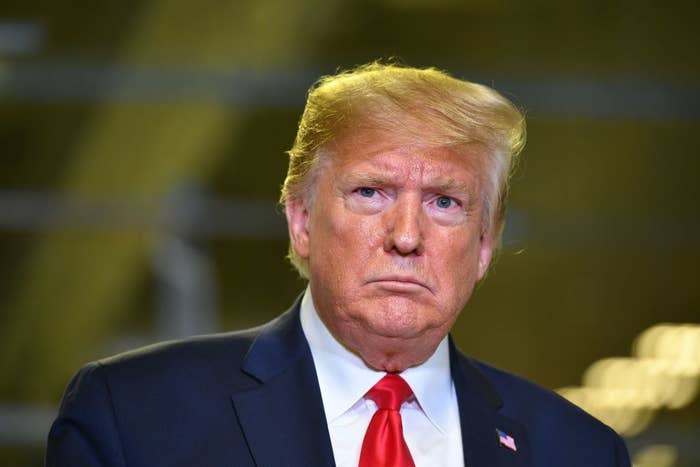
President Donald Trump’s financial records can remain private while the Supreme Court considers a case that tests Congress’s right to investigate the president and could uncover Trump’s past dealings during an impeachment inquiry.
The Supreme Court issued a brief order Monday evening that gives Trump 10 days to formally appeal a lower court’s ruling against him and keeps his financial records under wraps at least temporarily. However, the stay does not guarantee the high court will hear the case. If the court denies his request for an appeal — known as a petition for a writ of certiorari — the lower court’s mandate to release the records will prevail.
“Should the petition for a writ of certiorari be denied, this stay shall terminate automatically,” the court said.
The House Oversight Committee, controlled by Democrats, issued a subpoena for the records — including, possibly, his tax forms — after one of the president’s personal lawyers, Michael Cohen, said in February that “Mr. Trump inflated his total assets when it served his purposes ... and deflated his assets to reduce his real estate taxes.”
The Supreme Court had already given Trump a brief reprieve on Nov. 18, but only while the committee submitted additional court filings. Democratic lawmakers argued on Nov. 21 that a lower court’s order to release the records should take effect immediately.
Although the dispute began with allegations that Trump misrepresented his finances, it’s become wrapped up in his impeachment inquiry. House Speaker Nancy Pelosi said in her Sept. 24 announcement that the probe would encompass ongoing investigations, including those by the House Oversight Committee. As such, records obtained by the committee now could be used in the impeachment case.
In his personal capacity, Trump and his flock of corporations filed a complaint in US District Court in Washington, DC, in April that attempted to block the request and prevent compliance by his accounting firm, Mazars USA, LLP. Trump had argued Congress lacked authority to seize those documents, including those that predate his presidency.
Trump claimed the committee was attempting a law-enforcement function beyond its constitutional scope. But the committee successfully argued in court that the request was, indeed, legitimately legislative. Committee Chair Elijah Cummings, who died in October, noted that at least three bills in Congress at the time dealt with financial ethics and transparency of federal officials. Seeing Trump’s records could show if existing laws were effective, Cummings contended. He wanted to know if Trump had conflicts of interests, had received money from foreign governments, and had reported his finances accurately.
A divided panel of judges at the US Court of Appeals for the District of Columbia upheld the lower court’s decision, saying that the mere possibility records could reveal a crime did not make the request for records an inherent law-enforcement action. In siding against Trump, the appeals court said it would mandate that Mazars hand over Trump’s records.
Both lower courts cited prior court rulings against presidents, from James Buchanan to Bill Clinton, who had argued unsuccessfully that congressional efforts to seize records overstepped Congress’s power. “Disputes between Congress and the President are a recurring plot in our national story,” the appeals court wrote, noting that Mazars is a third party, not the president himself, and Trump had never claimed executive privilege spared the records from disclosure. ”We conclude that the subpoena issued by the Committee to Mazars is valid and enforceable.”
Trump’s lawyers began a final push on Nov. 15 by filing an application with the Supreme Court to block the lower court’s order, calling the subpoena an “unprecedented demand for his personal papers,” in part because the requested records predate his time in office, and because it represented the first time Congress had used legislative powers to “investigate the President for illegal conduct.”
The House Oversight Committee responded on Nov. 20 by contending the lower courts ruled correctly in ordering Trump’s accountant to disclose his finances, adding that more than seven months had elapsed since it issued the subpoena. “Even if Applicants’ extravagant legal claims had any merit,” the committee’s lawyers told the court, “this time-sensitive case would be a poor vehicle to address them.”
Another case at the Supreme Court also considers financial records of the president, who has lost that case thus far in New York state court and the Second Circuit Court of Appeals — both rulings are on hold. Cyrus Vance, a district attorney in Manhattan, is trying to obtain the documents, while Trump has countered that sitting presidents are immune from criminal prosecution and cannot be sued in a state court. The Supreme Court is considering whether Trump can appeal those decisions as well.
